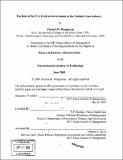The role of the U.S. Federal Government in the student loan industry
Author(s)
Mungovan, Patrick M. (Patrick Mullahy)
DownloadFull printable version (2.859Mb)
Alternative title
Role of the United States Federal Government in the student loan industry
Other Contributors
Sloan School of Management.
Advisor
S.P. Kothari.
Terms of use
Metadata
Show full item recordAbstract
Beginning in the early 1980's, average tuition and fees for higher education institutions in the United States experienced two decades of unprecedented growth. Over the 10-year period ending in 2003-2004, average tuition and fees rose 47 percent at public four-year colleges and universities and 42 percent at private four-year institutions. The growth rate over the preceding decade was even more significant at 54 and 50 percent, respectively. Much of the liquidity required by students and families to fund the cost of higher education has been supplied by the SLM Corporation, also known as Sallie Mae. Founded in 1972 as a Government Sponsored Enterprise (GSE), Sallie Mae is the nation's largest source of funding for higher education loans. Like other GSE's, Sallie Mae has been accorded a series of benefits which it has used to great benefit. Objective: This thesis: 1) Discusses the history of the student loan industry, including origins and significant events in its development 2) Examines the financial relationship between the federal government, Sallie Mae, institutions of higher education, and students 3) Evaluates the role of the federal government in the student loan industry and proposes alternative models In light of the social, economic, and political benefits affiliated with higher education, potential obstacles such as accessibility and affordability are critical considerations. As a significant funding mechanism, the student loan industry directly impacts these issues and therefore plays a critical role in the current and future welfare of society.
Description
Thesis (M.B.A.)--Massachusetts Institute of Technology, Sloan School of Management, 2005. Includes bibliographical references.
Date issued
2005Department
Sloan School of ManagementPublisher
Massachusetts Institute of Technology
Keywords
Sloan School of Management.